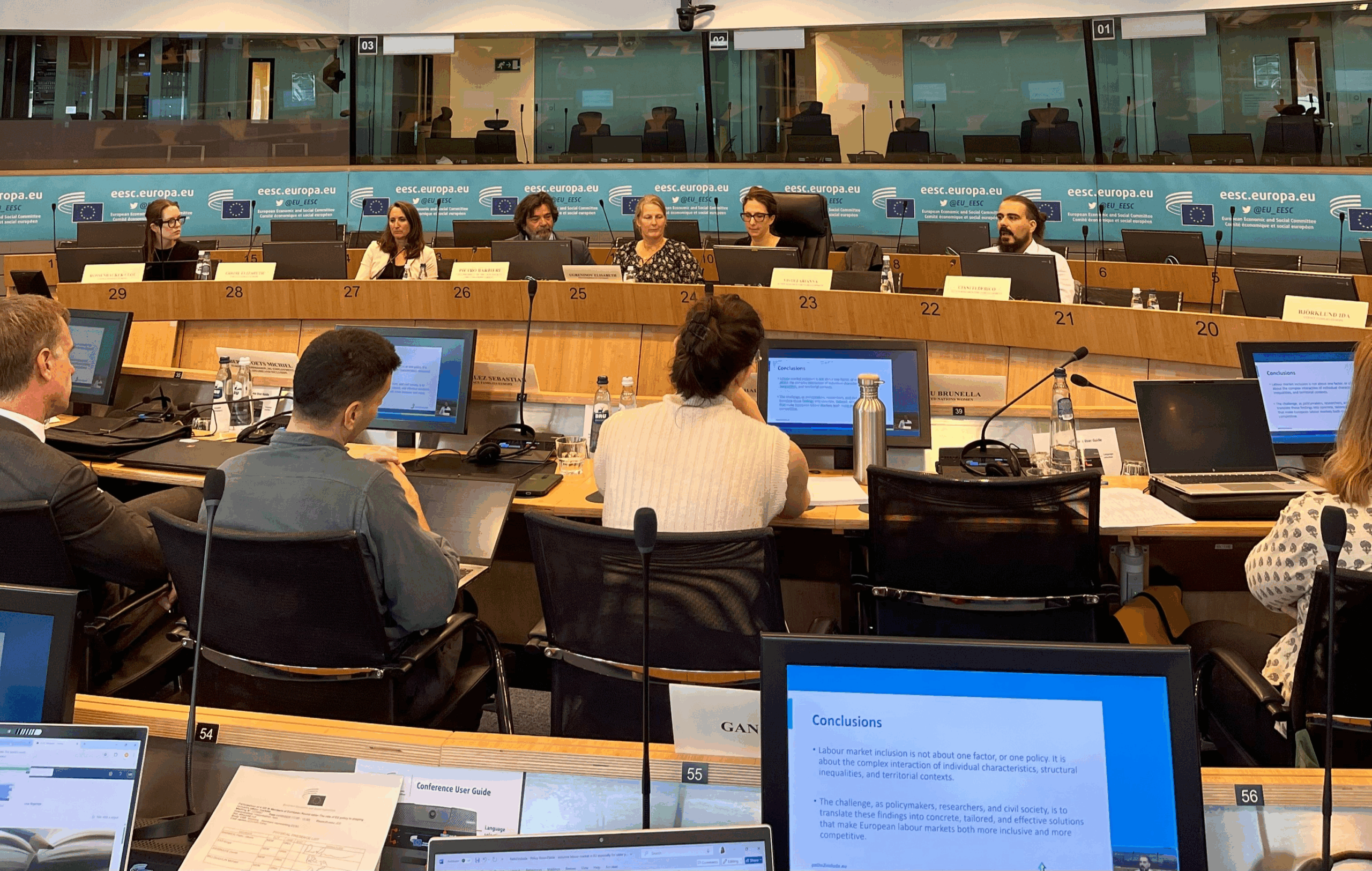On 4 September 2025, PATHS2INCLUDE’s policy round table on the role of EU policy in shaping inclusive labour markets took place in Brussels, Belgium. The event was organized in cooperation with the Civil Society Organisations’ Group of the European Economic and Social Committee (EESC).
The round table brought together 29 participants consisting of EESC members, representatives from social partners, European civil society organizations working on age, health, poverty and equality, different departments of the European Commission as well as a UN representative. The diversity of the group enabled a constructive exchange of perspectives and ideas.
Opening by host: the Civil Society Organisations’ Group of the EESC
The participants were warmly welcomed by Mr Pietro Barbieri, Vice-President of the EESC Civil Society Organisations’ Group. He highlighted that:
“Civil society have an important role in shaping inclusive labour markets. Inclusive labour markets are not only the domain of social partners – civil society organisations can contribute in various ways, highlighting discrimination and vulnerabilities, also providing different types of supports – peer support, coaching and more – to empower vulnerable workers on the labour market.”
Mr Barbieri believes there is an important role for the Civil Society Organisations’ Group (Group III) of the EESC in this respect, in their dialogue with the trade unions (Group II) and employers’ Organisations (Group I), also represented at the EESC, and showed interest in strengthening cooperation with PATHS2INCLUDE on this topic beyond the Round Table discussion.
Introduction to the project
Dr Elisabeth Ugreninov from Oslo Metropolitan University (Oslomet, Norway), Dr Federico Ciani and Dr Arianna Vivoli from Action Research for Co-Development (ARCO, Italy) presented emerging findings on inclusive labour markets from PATHS2INCLUDE. In their presentation, they highlighted the importance of striving towards more inclusive labour markets and how this contributes to the overall competitiveness of the EU. They also discussed the importance of individual characteristics (such as health, age and gender) and contextual factors to make labour markets more inclusive, and how these characteristics interact.
How can EU policies shape more inclusive labour markets?
After the presentation, an hour-long discussion took place during which participants were asked to share their reflections and recommendations on the role of the EU in shaping inclusive labour markets.
Some key points made during the discussion were the following:
- The role of equality bodies was highlighted as important in monitoring application of EU legislation relevant for inclusive labour markets, namely through the full implementation of anti-discrimination legislation. Further guidelines from the European Commission on applying intersectionality would help the equality bodies in this respect. There are some good practices on intersectionality, with one example the equality body in Belgium where the experiences of age discrimination are being studied across a wide range of sectors, as well as their use of a ‘diversity barometer’.
- The EESC has recently adopted an opinion on inclusive entrepreneurship which contains a number of useful recommendations for action. The opinion highlights that persistent labour market inequalities across Europe affect women, young people and vulnerable groups, including persons with disabilities. Entrepreneurship holds significant potential to address these disparities by empowering individuals, fostering innovation and generating economic growth that benefits society as a whole.
- Links were made with the work of the EU on climate and ensuring a just transition, namely the role of the 2019 Council Recommendation on ensuring a fair transition towards climate neutrality which also examines situations of vulnerability through peer exchanges between Member States (linked to the SPC and EMCO) and the Social Climate Fund. Additionally, the 8th environmental action programme contains a number of indicators on wellbeing which can also be a useful frame to use. European research initiatives were highlighted such as a new European Observatory on Fair Transition as well as a new Partnership on social transformations and resilience to be launched under Horizon Europe.
- The Review of the European Union by the UNCRPD committee was referred to during the discussion. The results of the review were published in March 2025 with a number of recommendations which can guide policy priorities. This includes recommendations in relation to action on public procurement procedures and others to create more inclusive labour markets.
- There were suggestions to advocate for an Age Employment Package (much like the Disability Employment Package), bringing together the data gathered from PATHS2INCLUDE and many other sources as evidence to develop EU actions in this field. This would allow for a more holistic approach to age, going beyond focus on pension reform only in relation to age matters.
- Collective agreements between social partners are considered an important tool for promoting labour market inclusion. The social partners present in the meeting reminded participants about different national collective agreements which help shape more inclusive labour markets, as well as EU collective agreements in different fields and sectors, such as the EU agreement on active ageing.
- The Quality Jobs Roadmap (to be published in December 2025) was referred to by different participants as a key space to bring PATHS2INCLUDE findings, namely to strengthen the focus on vulnerability in the discussion on quality jobs.
- Public Employment Services were perceived as key levers for driving change towards inclusive labour markets, with recommendations to connect PATHS2INCLUDE with the PES network managed by DG EMPL of the European Commission.
- The compounding effects of intersectionality were referred to as something to look out for in the findings of the PATHS2INCLUDE research, with reference to care as a triple burden affecting women: as domestic migrant workers, unpaid informal carers and later in life as women live longer and therefore are likely to require long-term care.
- The current siloed approach in EU policies was raised as an issue by multiple participants, highlighting that strategies such as the European Pillar of Social Rights, the Gender Equality Strategy, and Strategy for the rights of persons with disabilities, often operate in parallel rather than in coordination.
- The EU is preparing a Strategy on Intergenerational Fairness, which holds much potential for supporting inclusive labour markets which work for all generations. While the PATHS2INCLUDE research does not dive into solidarity between generations specifically, note was taken to see how to interpret the research findings through this specific lens.
- Different participants referred to the pros and cons of flexible work arrangements as a tool to address discriminatory practices in the labour market. Within flexible work arrangements, there is telework or remote working which is an option in some professions but not all, hence this was perceived by some as an ineffective way of reaching workers in vulnerable situations. But flexible work arrangements are more than remote work, this can include reduction of working time for instance. The EESC has recently adopted an opinion on work-life balance which pinpoints some of the shortcomings of this tool. Other participants highlighted that flexible work arrangements have actually provided new opportunities for groups in vulnerable situations such as persons with disabilities and people living in remote/rural areas, although this way of working requires a new set of (digital) skills pointing to the need for a focus on skills investment – especially important for the digital and green transition.
- Transitions from education to employment were mentioned by different participants as a moment of vulnerability for young people especially, with reference to the European Youth Guarantee objectives (e.g. with targets to reduce the time that young people spend not in employment nor education, as this can affect their future work prospects and wellbeing). The Quality Framework for Traineeships package was also referred to as an important way to reduce vulnerability of youth in this transition.
- Employers gain from inclusive labour markets, always looking for talent but there are some structural issues that need to be dealt with such as skills mismatches. Flexible work arrangements were mentioned by employers not only as a tool to reduce discrimination, but also to attract new talent since many workers expect this to be part of salary packages today.
- EU data collection was discussed at length from different perspectives, namely highlighting data gaps in key European surveys which amounts to a form of institutional discrimination. The variables related to disability and care could be improved as definitions are not always clear. Surveys based on subjective assessment can lead to biased data, for instance as there are different degrees of disability and different perceptions of disability. Health-related limitations can be more taboo in some countries than others, with lower self-reporting about health limitations due to cultural reasons.
- Flexible work arrangements need to be complemented with decent service infrastructure to be effective. This includes care infrastructure (which is being addressed by the European Care Strategy) as well as sound transport infrastructure (especially important for workers in more vulnerable situations).
- Health promotion was referred to as an important protective factor to help reduce labour market vulnerability and discrimination, with recommendations to mainstream this topic across all 20 principles of the European Pillar of Social Rights, with a specific focus on strengthening Principle 16 on Healthcare in the renewed action plan for the implementation of the Pillar.
We would like to thank all participants for the rich discussion, as well as the Civil Society Organisations’ Group of the EESC for hosting the event. The outcomes of the discussion will feed into a PATHS2INCLUDE policy brief, aimed at institutional and policy stakeholders, focusing on best practice for shaping inclusive labour markets. Please subscribe to our newsletter or follow us on social media (LinkedIn or Bluesky) to receive updates on newly published policy briefs or other publications.
Presentation Policy round table on the role of EU policy in shaping inclusive labour markets by Dr Elisabeth Ugreninov, Dr Federico Ciani and Dr Arianna Vivoli.

